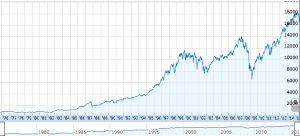Much like the rest of the news out there today, a decent amount of financial news out there is pretty ‘doomsday’, pessimistic and frightening. It won’t take many articles before you feel the urge to sell all your assets, buy gold and bury it in the back yard. I’ve been a financial blogger for quite some time now, and surprisingly the narrative doesn’t change. It doesn’t seem to matter who is president or how the economy is doing; there are always a bunch of articles predicting the coming financial meltdown. What’s a young professional to do in a world like this? My advice is to tune it out and focus on your own investing strategy.
Doomsday articles are fear mongering click bait wastes of time
“Top financial advisor sees stocks plummeting in 2017”, “Ron Paul advises investors to put their money in gold”, “Expert who saw crash in 2008 predicts another one soon”. These are all examples of headlines I’ve on the Internet recently and would lead one to fear for the worst. Sadly, most of these articles aren’t even real, and are meant to garner a click that will eventually lead to advertisements of sorts. Although it’s difficult to sort real news from fake news, do your best and try to avoid shock and awe financial headlines that draw your attention.
The market has ups and downs, but you’re in it for the long haul
Over the course of the last 100 years or so, there’ve been quite a lot of ups, and quite a lot of downs in the market. Our older grandparents probably still remember the stock market crash that led to the great depression, and most of us vividly remember the 2008 financial crisis and the stock market fall. The thing is though – the market came back both times and has risen to higher levels. If you had your money stocked away under a mattress, you would have lost out on all those returns. Most of your financial investments should be invested for the long-term horizon – which means that you’ll be able to weather a crash. Don’t pull your money out, or even worry about it too much. Over time, (unless we have bigger problems on our hands), the market will come back (if 100 years of history is any indication) and you’ll be better off leaving your money as is and continuing with your investment strategy (keep investing).
Once you give into fear, it’s hard to get away from it
Imagine that you did heed the advice of some ‘expert’ and pulled your money out. Perhaps you’ll avoid some loss of your investments by sitting on the sidelines. The more difficult piece however, will be deciding when to get back into the market. If you do want to build wealth over time, really the only way to do so is through investing (a savings account interest rate certainly won’t cut it) in the stock market. All that fear that led you out of the market will likely keep you on the sidelines fearing another fall or dip. Over time, as the market comes back, you’ll continue to be in fear about hopping back in, and eventually when you do, probably will do so at a much higher price than if you had just stayed in all along.
Stick to the principles
It’s a common recommendation to invest 15% of your income into a retirement account. I personally follow it, and encourage you to do so as well. This principle holds true regardless of whether the market is doing well, or not so well (i.e. a financial crash). When the market is low, you’re getting a lower cost on your investments, and when the market is high, you’re continuing to invest with the hopes of it going higher. In terms of actual investments, a low-cost index fund is probably your best bet. Invest at a regular interval (likely each paycheck or monthly contributions) and buy into the same index fund. Over time, with highs and lows, your money would grow and grow, allowing you a comfortable retirement!


 Personal Finances are certainly top of mind for many of us. If you're looking to get serious about improving your financial situation, we've got lots of great materials all over this site! Additionally, we realize that there's a lot of noise out there, and so we created PERSONAL FINANCIAL GUIDES focused on topics with all the info you need, and without any of the noise/ads/clickbait.
Personal Finances are certainly top of mind for many of us. If you're looking to get serious about improving your financial situation, we've got lots of great materials all over this site! Additionally, we realize that there's a lot of noise out there, and so we created PERSONAL FINANCIAL GUIDES focused on topics with all the info you need, and without any of the noise/ads/clickbait.